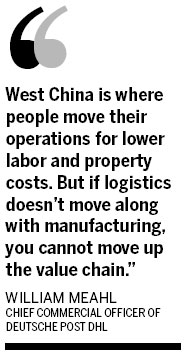DHL setting its sights on China's western regions
Updated: 2013-06-19 07:42
By He Wei in Shanghai (China Daily)
|
||||||||
Deutsche Post DHL, one of the first foreign courier companies to enter China, will tailor its services for the country's booming western regions, a top company executive said on Tuesday.
A growing number of enterprises are relocating to these regions to better manage costs and increase efficiency.
The company, with headquarters in Bonn, Germany, will provide a range of solutions, including new warehouse management systems, to help manufacturers rein in logistics spending following the huge urbanization drive in China's inland areas, according to William Meahl, DHL's chief commercial officer.
"West China is where people move their operations for lower labor and property costs. But if logistics doesn't move along with manufacturing, you cannot move up the value chain," Meahl told China Daily on the sidelines of DHL's annual global technology conference in Shanghai.
The company will strengthen its ability to connect clients in western China to the rest of the world, and by using an intensified air and rail network will consolidate various business services to be delivered to Asia.
Asia accounted for 20 percent of DHL's global sales last year, with China claiming half of this share. Meahl said he expects the Asian percentage to rise to one-third in the next five years, with China continuing to take the lead.
He identified the high-tech sector - driven by constant innovation, short product cycles and new sales channels - as one of the key growth areas of DHL's China business portfolio.

The changing nature of technology will amplify the role of logistics in having a competitive edge, Meahl said, citing examples of the emergence of mobile devices ahead of personal computers as the preferred access tool for the Internet.
DHL estimates that 60 percent of all IT hardware growth will come from tablets and smartphones this year.
"From a logistics point of view, the prevalence of mobile devices translates into shrinking size of goods, meaning that each shipment has to handle many more units of goods than before," Meahl said.
With China heavily involved in the IT manufacturing industry, DHL has developed a range of solutions to help address such challenges, including direct distribution services like Door-to-More and Break Bulk Express, and options to reinforce high-quality customer service offerings, such as Technical Service.
A trend toward simplified and lighter products, combined with price pressure, is challenging manufacturers and suppliers to find solutions to improve the cost efficiency of the technology supply chain. This has led to an increase in the use of shared logistics platforms such as multi-user warehouses.
Up to 20 percent of DHL's annual spending goes to developing IT solutions.
Meahl also said he believes China's e-commerce boom will fuel further momentum for the company.
Speaking of the recent decision by Alibaba Group Holding Ltd to set up a national logistics network, he said it means more of a partnership, rather than competition, for DHL
Tan Piak Hwee, DHL's vice-president of marketing and sales in China, said:"It's only natural for online marketplaces like Alibaba to think about how they facilitate solutions for products that are being sold and bought. DHL can leverage on its worldwide coverage to serve online sites with last-mile delivery and international transportation needs."
Meahl has seen a growing number of Chinese businesses emerge among DHL's global top 100 clients, which used to be dominated by US and European conglomerates. He said a variety of Chinese companies, from State-owned enterprises to privately run firms, are eyeing international opportunities, and DHL is poised to become their partner in these global pursuits.
Since 2013, the company has strengthened its Asia-Pacific aviation network with more wide-bodied aircraft, connecting major markets in Asia and providing additional direct links with the Americas.
It invested $175 million last year in Shanghai to launch its biggest express hub in Asia.
hewei@chinadaily.com.cn
(China Daily USA 06/19/2013 page13)

 Michelle lays roses at site along Berlin Wall
Michelle lays roses at site along Berlin Wall
 Historic space lecture in Tiangong-1 commences
Historic space lecture in Tiangong-1 commences
 'Sopranos' Star James Gandolfini dead at 51
'Sopranos' Star James Gandolfini dead at 51
 UN: Number of refugees hits 18-year high
UN: Number of refugees hits 18-year high
 Slide: Jet exercises from aircraft carrier
Slide: Jet exercises from aircraft carrier
 Talks establish fishery hotline
Talks establish fishery hotline
 Foreign buyers eye Chinese drones
Foreign buyers eye Chinese drones
 UN chief hails China's peacekeepers
UN chief hails China's peacekeepers
Most Viewed
Editor's Picks

|

|

|

|

|

|
Today's Top News
Shenzhou X astronaut gives lecture today
US told to reassess duties on Chinese paper
Chinese seek greater share of satellite market
Russia rejects Obama's nuke cut proposal
US immigration bill sees Senate breakthrough
Brazilian cities revoke fare hikes
Moody's warns on China's local govt debt
Air quality in major cities drops in May
US Weekly

|

|







